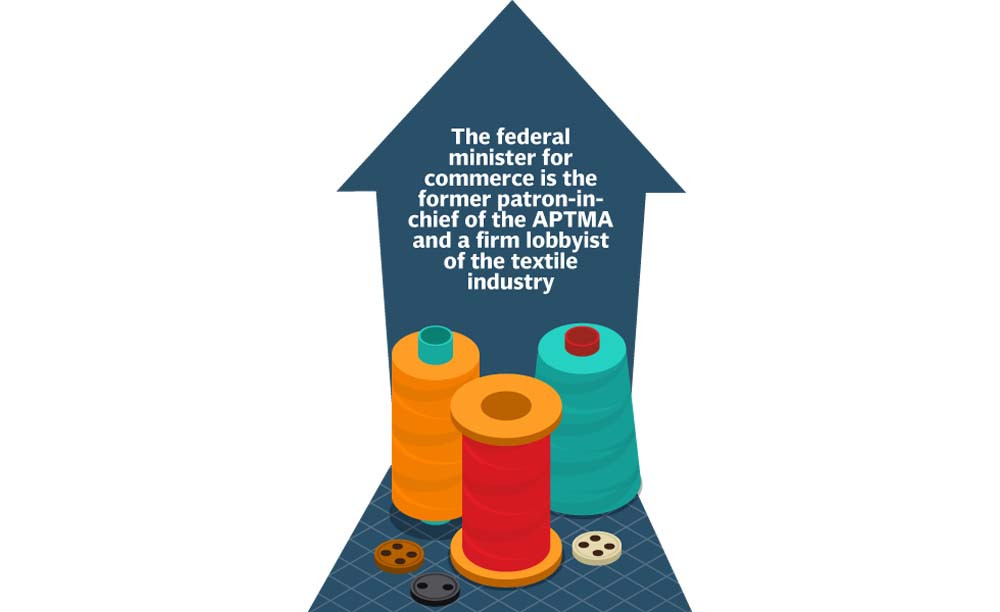Preferential treatment for industries
Ministry proposes special tariffs, moratorium on loan payments to SIFC

The Ministry of Commerce has proposed that the Special Investment Facilitation Council (SIFC) approve a preferential cost-based electricity tariff, a moratorium on loan payments, and the restoration of a no-sales tax payment scheme to enhance exports by 20% this year.
The proposals were made during the last meeting of the Council but were not immediately endorsed. The civil-military-led SIFC has referred the matter to its executive committee, which will deliberate on these recommendations next week, according to government sources.
Prime Minister Anwaarul Haq Kakar chaired the SIFC meeting, which was also attended by Chief of Army Staff General Asim Munir.
The Ministry of Commerce’s proposals are aimed at continuing the status quo where a handful of industrialists have benefited from state resources for the past three decades without providing any net real benefit to the country. The ministry also raised the stakes when it presented these proposals at the Cabinet Committee for Economic Revival three days before the SIFC meeting, said the sources.
These proposals are also contrary to Pakistan’s commitments to international financial institutions, which require the withdrawal of tax exemptions and no special treatment for any category of electricity consumers.
In February this year, Pakistan withdrew the electricity subsidy for exporters under the last International Monetary Fund (IMF) programme. The government also withdrew the zero sales tax scheme for exporters under the last IMF programme.
The sources said that the Ministry of Commerce proposed that the cross-subsidy by the industrial sector to domestic users was eroding the competitiveness of exports. It recommended that industrial tariffs should be based on the cost of service to address these issues.
The proposal is meant to provide special treatment to the industrial sector, as even domestic consumers using over 200 units per month are subsidising consumers in lower categories.
It is pertinent to note that the federal minister for commerce and industry is the former patron-in-chief of the All Pakistan Textile Mills Association and a firm lobbyist of the textile industry.
The sources said that there was also pressure on the Power Division to take one power plant with a capacity of 1,200 megawatts in Punjab off the grid and hand it over to the industry for the provision of electricity at generation prices.
The commerce ministry argued that these incentives would help increase exports by 20% during the current fiscal year.
Exports in the last fiscal year plunged 11% to $28.3 billion. Likewise, the exports of textile goods also dropped to $16.8 billion, a decline of 14.3%, despite massive currency devaluation.
Exports have long relied on traditional goods, living on state handouts and subsidies, and have not introduced new technologies and innovations in their businesses. Many of them do not even bring their export proceeds home within the regulatory timeframe and wait for more currency depreciation to gain an advantage.
According to a working paper by the Ministry of Finance, exporters gained a windfall of Rs1.5 trillion in the past almost four years just because of currency devaluation. Exporters paid only Rs74 billion in taxes compared to Rs264 billion paid by the salaried class.
The SIFC was also proposed that only a 1% wheeling charge should be recovered from the industry.
The commerce ministry has also proposed implementing a weighted average cost of gas formula aimed at charging a single price for local and imported gas. The IMF has also asked Pakistan to implement a single gas price across the country.
The Ministry of Commerce demanded that exporters should be given top priority in the allocation of gas.
In a major proposal, the Ministry of Commerce has recommended to the SIFC that the payment of principal loans as well as interest payments should be deferred for one year for the industrial sector.
The recommendation has been made to address the liquidity issues being faced by exporters. The high-interest rate environment has significantly increased the cost of doing business.

design: Ibrahim Yahya
The Ministry of Commerce has also demanded the settlement of Rs24 billion duty drawback claims of exporters. It has also proposed to the SIFC to instruct banks to enhance financing credit limits for industry by 100%.
The industrial sector gets loans at subsidised rates.
The ministry has proposed enhancing the coverage of export finance schemes to the entire value chain.
The commerce ministry has also sought control of the Exim Bank from the Ministry of Finance. The bank has remained dormant for the past almost eight years, and the ministry now wants the bank to have a license for general banking.
The sources said that a few days before the SIFC meeting, the commerce ministry also proposed these recommendations in the Cabinet Committee on Economic Revival (CCER).
The CCER decided that the minister for commerce would provide the to-do list along with the required support from other government entities to boost exports.
Published in The Express Tribune, September 24th, 2023.
Like Business on Facebook, follow @TribuneBiz on Twitter to stay informed and join in the conversation.



















COMMENTS
Comments are moderated and generally will be posted if they are on-topic and not abusive.
For more information, please see our Comments FAQ